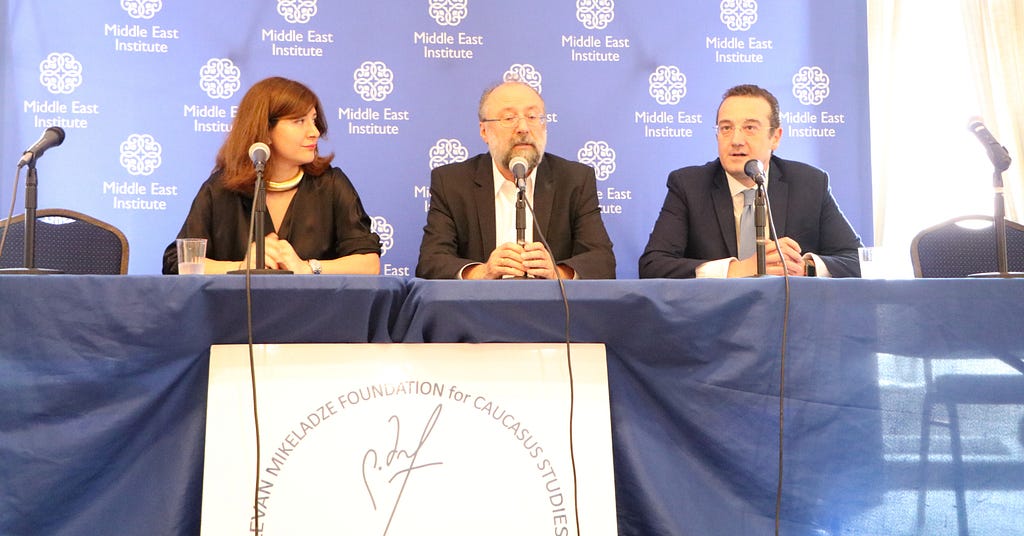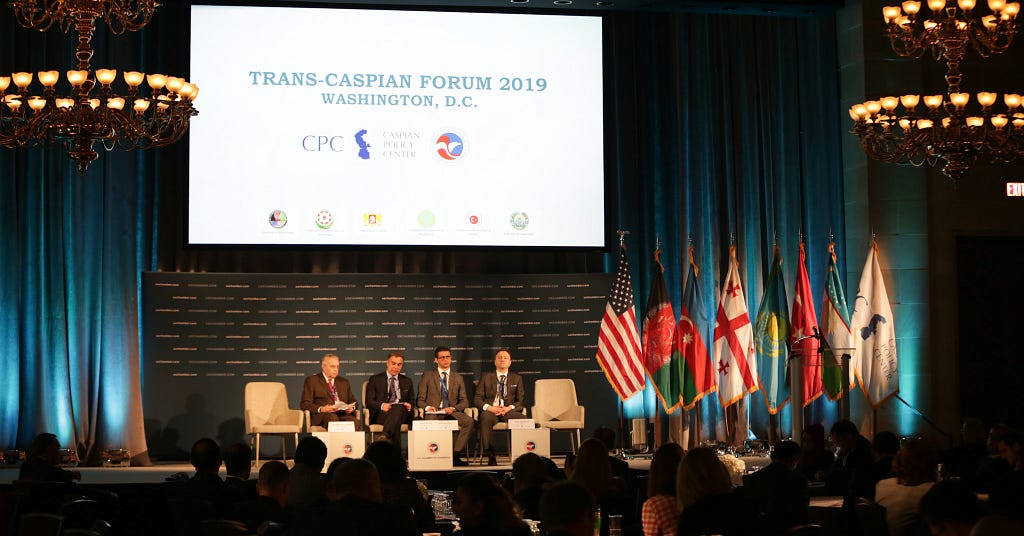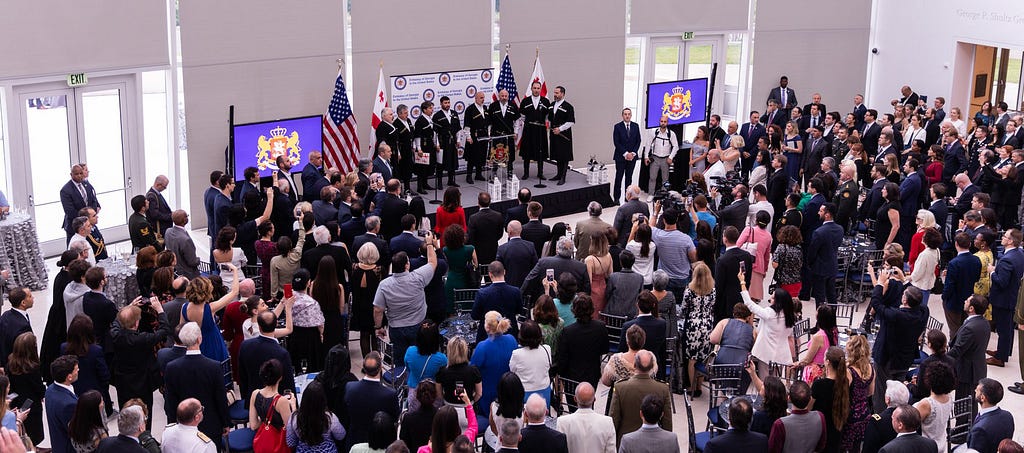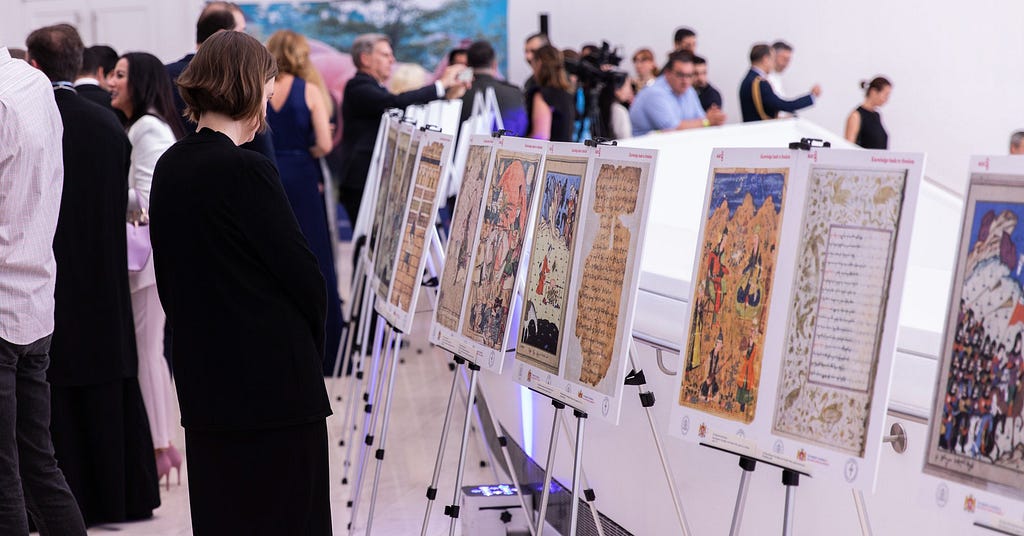

Within its 3,000 year-long history of Georgian statehood, the last two centuries saw Georgians fighting annexation by the Russian Empire — from 1891–1918 — when Georgia gained independence from czarist Russia and established its short-lived First Democratic Republic.
This was aborted by the Soviet occupation of Georgia in 1921, inaugurating Russian domination that lasted for the next 70 years, until the breakup of the USSR in 1991.
The Embassy of Georgia to the United States marked regaining Georgia’s independence and the centennial anniversary of the first parliament of Georgia (1919–1921) by organizing a cycle of events that peaked in May and June.


The Embassy of Georgia kicked off celebratory events on May 8th with the “Georgia and Its Neighborhood” conference hosted by the Levan Mikeladze Foundation at the Middle East Institute in Washington, D.C. The annual conference gave an excellent overview of the political and economic developments in Georgia and wider region. Experts described Georgia’s successful reforms that lifted the country in most international rankings. Conference participants underlined the steady course of Georgia towards Euro-Atlantic integration, and they discussed the experience of Georgia’s government and society to counter Russian propaganda and disinformation. The conference also highlighted new avenues for deepening the already robust US–Georgia strategic partnership.


International trade, energy, and transportation routes that connect the West and the East were the topic of discussion on May 22–23 at the 4th annual Trans-Caspian Forum 2019 hosted by the U.S. Chamber of Commerce and Caspian Policy Center, in partnership with the diplomatic missions of Georgia, Azerbaijan, Turkey, Afghanistan, Turkmenistan, Uzbekistan, and Kazakhstan. The forum brought together participants from the Caspian and the Black Sea regions to discuss a transit corridor between Europe and East and Southeast Asia that would connect trade, people, and economies.
“Georgia is determined to put lots of effort into cooperation with its regional partners in diversifying transport routes, implementing related trade and energy initiatives, increasing effectiveness of this cooperation, and boosting economic ties between Europe and Asia,” noted Ambassador David Bakradze in his opening remarks. “Georgia is an open economy with liberal trade regimes with all our allies.”


Delegation members From Georgia — Mr. Alexi Alexishvili, Chairman and CEO of the Policy and Management Consulting Group (PMCG); and Mr. Viktor Kipiani, Partner at Mgaloblishvili, Kipiani, Dzidziguri (MKD) — talked about significant current and upcoming infrastructure projects in Georgia. They emphasized the importance of transit corridors and cooperation among the countries in the region to increase trade and attract investment.


A contemporary Georgian film series – “New Wave Now: Georgia’s Independent Voice” was held at the Museum of Fine Arts in Boston/MA on May 23–26. The series was dedicated to Georgia’s Independence Day celebrations. The series of four feature and documentary films was co-presented within the MFA’s film program by the Embassy of Georgia and Boston-based Ballets Russes Arts Initiative, with support of the Georgian National Film Center. The film series was paired with a Georgian Wine Celebration featuring wines from Georgian Toast Imports in SoWa’s A R E A Gallery on May 25th.
Young Ambassador of Georgia Tato Okruashvili and Embassy of Georgia organized the Georgian National Flag Raising Ceremony, accompanied by a Georgian folk dance concert, at City Hall in Philadelphia on May 24th. The ceremony was attended by Congressman Brendan Boyle, representatives of Mayor’s office, and members of the local Georgian diaspora.
On June 12th, the Embassy of Georgia, in celebration of the Independence Day, hosted its 3nd Annual U.S.–Georgia Strategic Partnership Conference in concert with The Heritage Foundation and United States Institute of Peace (USIP). The conference discussed the U.S.–Georgia strategic ties at the first panel, “Geopolitics and Security: Ensuring Regional Peace and Stability.” The second panel, “Trade and Commerce: Regional Hub for Growth,” highlighted Georgia’s key interconnecting function for international trade and transit routes. Prime Minister of Georgia Mamuka Bakhtadze underlined milestones in U.S.–Georgia relations, and he emphasized in his opening remarks Georgia’s progress on its European and Euro-Atlantic path.
Later the same day, the Prime Minister hosted the Roundtable Luncheon with private sector representatives. He used the opportunity to introduce the audience to Georgia’s business favorable climate and investment opportunities, and to Georgia as a gateway country to markets of over 2 billion consumers.


That evening, Prime Minister Bakhtadze addressed the guests of the Embassy of Georgia-hosted Independence Gala Reception, where he was joined by U.S. Senator Cory Gardner (R-CO) and Georgian Ambassador to the United States David Bakradze. All three speakers stressed several generations of Georgians’ unremitting fight for freedom and the vital importance of a strong strategic partnership between the U.S. and Georgia for maintaining Georgia’s independence and sovereignty. The Prime Minister thanked the United States for the role it has played in strengthening Georgia and for supporting the country through difficult times.


The Embassy reception highlighted Georgia’s deep history and diverse culture. An exhibition featured the theme of “The Knight in the Panther’s Skin,” the famed Georgian medieval epic poem written by Shota Rustaveli in the 12th century. As part of the exhibition, guests were exposed to antique Golden Heritage replicas and artisan crafts, national costumes, and exhibition of the books and paintings on the epic poem. Guests also had an opportunity to enjoy the wonderful performance of the Georgian and American anthems, as well as traditional Georgian songs by the Ensamble Suliko, whose performance was supported by the Ministry of Education, Science, Culture, and Sport of Georgia.
